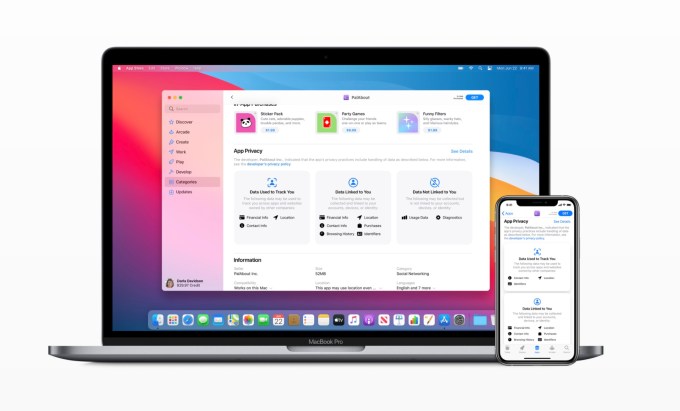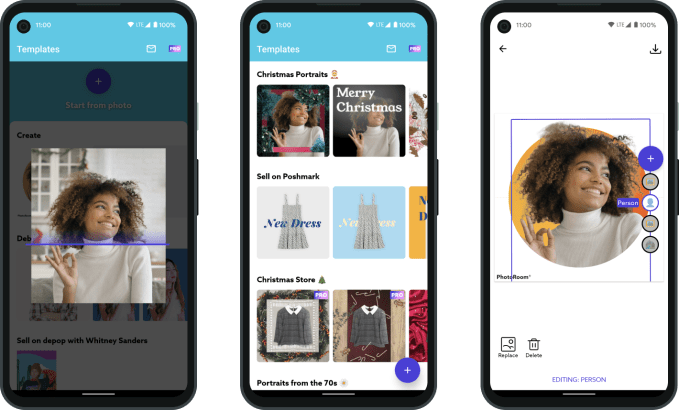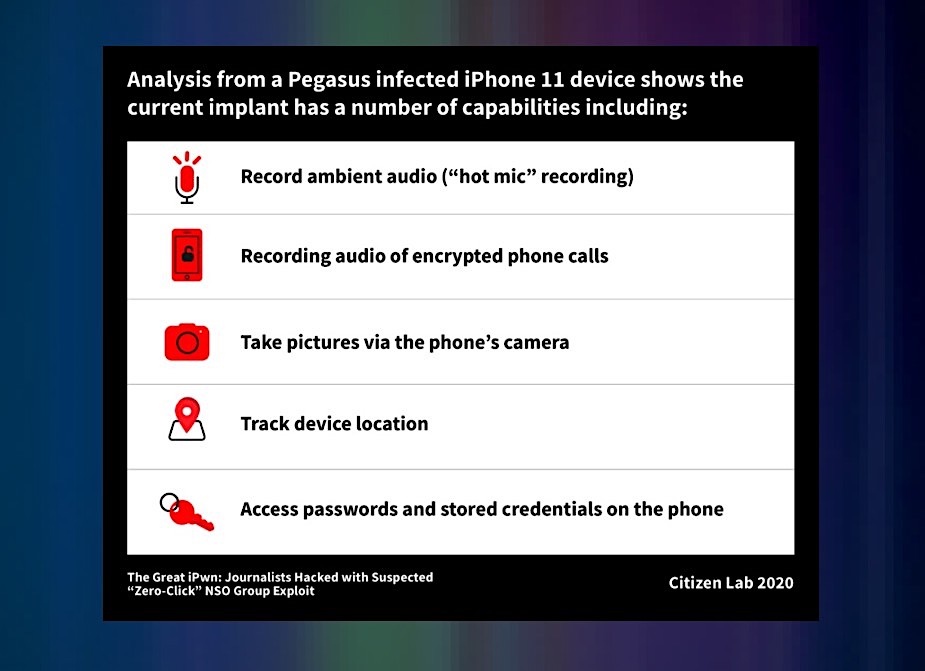- December 19, 2020
- by:
- in: Blog
Welcome back to This Week in Apps, the weekly TechCrunch series that recaps the latest in mobile OS news, mobile applications and the overall app economy. The app industry is as hot as ever, with a record 204 billion downloads and $120 billion in global consumer spend in 2019. Not including third-party Chinese app stores, iOS and Android
Welcome back to This Week in Apps, href=”https://techcrunch.com/tag/this-week-in-apps/”>the weekly TechCrunch series that recaps the latest in mobile OS news, mobile applications and the overall app economy.
The app industry is as hot as ever, with a record 204 billion downloads and $120 billion in global consumer spend in 2019. Not including third-party Chinese app stores, iOS and Android users downloaded 130 billion apps in 2020. Consumer spend also hit a record $112 billion across iOS and Android alone. In 2019, people spent three hours and 40 minutes per day using apps, rivaling TV. Due to COVID-19, time spent in apps jumped 25% year-over-year on Android.
Apps aren’t just a way to pass idle hours — they’re also a big business. In 2019, mobile-first companies had a combined $544 billion valuation, 6.5x higher than those without a mobile focus.
Top Stories
Apple launches App Store privacy labels

Image Credits: Apple
Apple this week launched its promised App Store privacy labels across all its App Stores, including iOS, iPadOS, macOS, watchOS and tvOS. The labels aim to give Apple customers an easier way to understand what sort of information an app collects across three categories: data used to track you, data linked to you and data not linked to you. Tracking, Apple explains, refers to the act of linking either user or device data collected from an app with user or device data collected from other apps, websites or even offline properties (like data aggregated from retail receipts) that’s used for targeted advertising or advertisement measurement. It can also include sharing user or device data with data brokers.
This aspect alone will expose the industry of third-party adtech and analytics SDKs (software development kits) — basically code from external vendors that developers add to their apps to boost their revenues.
Meanwhile, “data linked to you” is the personal information tied to your identity through your user account on the app, your device or other details. (You can read more about the program here.)
Axios compared how various social media and messaging apps compare as determined by the labels. Not surprisingly, it found that Facebook-owned apps collected more data than apps like Telegram, Signal and Apple’s Messages. It also found that Snap collected less data than the other major social networks.
Others noticed that Google had yet to provide any privacy label information for its biggest apps like Gmail, Googel Maps or Google Search.
Apple and Facebook fight over privacy changes
Also this week, Facebook took out full-page newspaper ads to attack Apple’s upcoming privacy-centered changes, alleging that the decision will have negative impacts on small businesses. With a forthcoming update to iOS 14, developers will have to ask users permission to use their IDFA identifiers for ad targeting purposes, and they’ll have very few characters to explain why it’s necessary. Most users, who are sick of having their data taken and resold without any personal control over that process, will likely just say “No.”
On the one hand, Facebook has much to lose as it already warned that without targeting and personalization, mobile app install campaigns brought in 50% less revenue for publishers. And the impacts to Facebook Audience Network on iOS will be even worse. But Facebook says it’s well-diversified enough so this one change won’t hurt its business as much as it will smaller ones run by “aspiring entrepreneurs.”
It also pointed out that Apple’s interests aren’t only about consumer choice. When developers make less money from the traditional targeted ads, they’ll turn to other means of generating revenues — like in-app purchases and subscriptions, benefiting Apple.
We should also point out that Apple does a lot of data gathering and targeting of its own. In your iOS Privacy Settings, when you scroll way down to the bottom of the page, then click on Apple Advertising followed by View Ad Targeting Information, you’ll find Apple’s own admissions of how it tracks you across its platform, including data from your account info (age, gender, location), and by what content you’ve downloaded on Apple Music, Apple TV, Apple Books and the App Store. It uses this data to target you with personalized ads on the App Store, in Apple News and in Stocks.
Apple, meanwhile, has presented Facebook’s tracking business as one that aims to “collect as much data as possible,” in order to “develop and monetize detailed profiles of their users,” in a “disregard to user privacy.” And while it’s true that Facebook’s network spans apps and websites, Apple is doing the same thing within its own ecosystem…of a billion iPhones and other devices. Devices where Apple’s own apps are often pre-installed and compete with third-party services in areas like books, music, TV, fitness, news and more.
Plus, Apple told developers when it launched the new App Store privacy labels this week, that developers don’t have to disclose the data collected by Apple itself. Uh, wonder why that is?
Instead, developers have to come clean about all the other ways they collect and use customer data, including if data brokers are involved.
The move of course is a big gain for consumer privacy, as it establishes a new baseline for the industry, lays bare the amount to which users are tracked and forces companies to re-establishment trust with their customers instead of sneaking behind their back to gather and sell their data. But it’s simultaneously an easy smokescreen for Apple’s own interests, and Apple should not get a pass on that aspect just because it’s also “a very good thing.” Apple wanted a bigger portion of the adtech market and to grow its subscription business and it wants to fight for consumer privacy. But it largely only highlights the latter when speaking to reporters or making public statements.
The risk of criticizing Apple for such a pro-consumer move is that it looks like a defense of Facebook. But this issue is too complex to require that you simply choose sides. There are ways that Apple can both tackle consumer privacy issues and be more upfront about its own ongoing data collection practices — and burying its data collection/ad targeting info at the very bottom of the iOS Privacy settings page is not it.
Twitter kills Periscope

Image Credits: Twitter
Twitter this week announced it’s shutting down its standalone livestreaming app Periscope, which it acquired in 2015. The company said the app had been “an unsustainable maintenance-mode state” for some time, and Twitter has seen its usage decline as costs went up. The app will no longer function by March 2021, but Twitter says it’s not giving up on live video. It notes that it brought most of Periscope’s core capabilities to Twitter over the years.
Users will be able to download an archive of their Periscope broadcasts and data before the app is removed and those that have been published to Twitter will continue to live on as replays.
Twitter has a history of making bad calls on its standalone apps that seemed like smart decisions at the time. The company was early to the idea that music and social could work well when tied together when it launched a standalone Twitter Music app in 2013. Years later, other companies have proven that to be true — TikTok said this week its app is driving hits, and got 70-some artists major label record deals. In 2020, over 176 songs passed 1 billion views as TikTok sounds.
Another idea Twitter killed, of course, was Vine, the app that could have been TikTok, had it lasted.
Now Twitter is killing its live video app, a project it abandoned, as everyone else is figuring out how to turn live video streams into e-commerce transactions. Today, Facebook and Instagram offer live video shopping, including in Instagram Reels, its TikTok rival. And TikTok itself launched its first big test of livestreamed video shopping in partnership with Walmart. Other big names who are investing in live video shopping include Amazon through its QVC-like Amazon Live, Alibaba through AliExpress, JD.com, Pinduoduo, WeChat and TikTok’s Chinese sister app, Douyin.
One could argue that Twitter just wants to stake out its own place and not follow the crowd, but its latest big feature was Stories, er, Fleets, a format that’s just about everywhere. And its current test product is Spaces, a rival to Clubhouse and a handful of other audio-networking startups.
Weekly News
Platforms: Apple
- Apple launches App Store privacy labels.
- Apple releases macOS Big Sur version 11.1, which allows iPhone and iPad apps without resizable windows to enter into full-screen mode on Macs with the M1 chip. HBO Max will benefit from this, as well as some mobile games.
- The Mac App Store publishes a list of apps that take advantage of the new M1 chip.
- Apple talks about how to design an App Clip URL more efficiently in new blog post. It also announced that App Clip Codes — the visual image that encodes a URL and can incorporate an NFC tag — are also now available for creation in App Store Connect or with the new command line App Clip Code Generator.
- Apple launched iOS 12.5 for older phones that don’t support iOS 14. The update brings the COVID-19 exposure notification support to these older devices and other security fixes.
- Apple releases iPadOS 14.4 public beta.
- Apple publishes a guide to locking down your Apple devices, which could be particularly useful for domestic abuse survivors.
Platforms: Google
- Google announced the Play Store is now open to more car apps, including navigation, parking and charging apps for Android Auto.
- Google Play Store opens up to 22 new countries in Africa, Oceania and elsewhere.
- Google announces Android Things platform shutdown is January 5, 2021.
Services
- Amazon’s AWS announced the preview of Amazon Location, a service that will allow developers to add location-based features to their web-based and mobile applications. Amazon Location is based on mapping data from Esri and HERE Technologies, and includes built-in tracking and geofencing, but not routing.
Gaming
- Game engine maker Unity teamed up with Snap to bring its Unity Ads supply to Snap Audience Network and bring Snap Kit to game developers. From the Unity Asset Store, game developers can use Snap Kit’s Login Kit and Creative Kit, the latter which allows users to decorate their videos with stickers or ad AR lenses. Bitmoji avatars will be integrated with Unity in early 2021.
- PUBG Mobile tops the list of billion-dollar mobile games in 2020, reports Sensor Tower. Five games topped $1 billion this year, including also Honor of Kings, Pokémon GO, Coin Master and Roblox.
- Amazon’s Luna cloud gaming service arrives on Android. Like the iOS version, the service works through the web browser in the U.S. It supports some Pixel, Samsung and OnePlus devices for now, with expanded device support arriving in time.
- Roblox delays IPO to 2021. The company said the IPO performance of Airbnb and DoorDash, which soared on their debut leaving money on the table, made it too difficult to price shares.
- A judge orders Apple to produce documentation from Tim Cook and Craig Federighi in the Epic Games/Fortnite lawsuit. The execs may also be called to testify, along with Eddy Cue, if Epic gets its way. Facebook also said this week it would aid Epic in its legal battle by providing supporting materials and documents, as a part of the discovery process.
- Google’s cloud gaming service, Google Stadia, arrives on iOS. The service bypasses the App Store to instead use a web app. It works on both iPhone and iPad (iOS 14.3 is required). Most games will need a gamepad to work.
Augmented Reality
- The Unity/Snap deal, mentioned above, includes an AR component. Snap’s Creative Kits allows users to share their gameplay, decorating still shots or 15-second videos with branded stickers, or attaching an AR lens that has been created with game branding to share with their Snapchat friends. These shares work to acquire new users as well, as they include referral links back to the game.
- Facebook’s Messenger Kids app updates with seasonal AR effects, as well as a way for parents to play Santa to kids.
- Google adds an AR Baby Yoda in its Google Search app.
Baby Yoda came over for a play date. Played with Adinasi, our 13 month old, for a bit but now he wants to see all of you! Invite him over by searching for “baby yoda” in the Google app. #googlear pic.twitter.com/vtGxygEYWX
— Rajan Patel (@rajanpatel) December 17, 2020
Social & Photos
- Facebook launches a TikTok-like app, Collab, that focuses on collaborative music making. TechCrunch had the exclusive interview.
- Twitter launches its voice-based Spaces social networking feature, a Clubhouse rival, into beta testing. The feature lets select Twitter testers for the time being gather in audio-only chat rooms on Twitter’s platform.
- Discord rolls out mobile screen sharing, allowing users to “hang out” and watch videos or anything else on their phone.
- Facebook relaunches Instagram Lite app, starting with a test in India before a global rollout. The app is under 2MB in size and is faster and more responsive. But it also lacks features like Reels, Shopping and IGTV.
- Dating and friend-making app Bumble confidentially files for a February 2021 IPO.
- Google Photos adds 3D “Cinematic” photos feature that uses machine learning to turn 2D photos into 3D — even if the original didn’t include depth information from the camera. A virtual camera then animates a smooth panning effect for a more vivid experience.
- TikTok’s new guidelines strengthen policies on harassment, self-harm, violence and dangerous acts. The social app also rolled out new well-being features, like opt-in viewing screens that hide distressing content, a text-to-voice feature to make TikTok more accessible and COVID-19 vaccine info.
- Halide’s developer offers a deep dive on Apple’s new ProRAW image format, which it describes as not just making RAW more powerful, but also more approachable. “ProRAW could very well change how everyone shoots and edits photos, beginners and experts alike,” a Halide blog post says. They’re not the only one singing ProRAW’s praises — Halide pointed to photographer Austin Mann’s blog post as well.
Streaming and entertainment
- Netflix added a new audio-only mode on Android that allows users to save bandwidth and instead only listen to their program. The feature aims appeal to emerging markets users but could also serve as a way to turn Netflix into an alternative to listening to podcasts, at times.
- Spotify launched on the Epic Games Store — a marketplace that’s shaping up to become a third-party app store. The two companies are both engaged with fighting Apple over its commission structure and rules on purchases.
- TikTok released its first-ever U.S. music report which revealed the social app’s outsized influence on the music industry. According to the report, more than 176 different songs surpassed 1 billion video views as TikTok sounds, over 70 artists that have broken on TikTok’s platform have received major label deals, including Claire Rosinkranz, Dixie D’Amelio, Powfu, Priscilla Block and Tai Verdes, and others.
- TikTok launches on TVs. The app is first available on Samsung smart TV models in Europe, but the Samsung partnership will allow it to be pre-installed going forward. The TV experience will be curated for family-friendly videos only.
- Apple redesigns Shazam for iOS so it better fits with Apple Music’s design language. The app is also now available on the web. Apple recently said Shazam had over 200M MAUs across iOS and Android.
E-commerce

Image Credits: Walmart
- Walmart partners with TikTok on a test of a new shoppable product that will allow TikTok users to transact within the app. The retailer will run a holiday shopping event inside TikTok, where users can shop from influencer videos. After the event, users can continue to shop from Walmart’s TikTok profile.
- Shoploop, an app founded within Area 120, Google’s in-house incubator, has graduated to Google Search. The app competes with efforts in video-based shopping from Facebook, Instagram, TikTok and others. Google has now brought Shoploop’s short-form influencer videos to Google Shopping.
- Discount e-commerce marketplace app Wish dropped below IPO price in its market debut. Wish opened at $22.75, below its $24 per share IPO pricing. Investors may be responding to the fact that Wish is growing slower and has a much smaller user base than top retailers, like Amazon and Walmart.
- App Annie predicts U.S. users on Android will spend more than 1 billion hours in shopping apps in Q4 2020, a 50% YoY increase. Mobile sales are expected to reach $314 billion by year-end.
Security and Privacy
- New mobile malware Goontact is targeting iOS and Android users in Chinese language-speaking countries, Korea and Japan. The spyware can steal contacts, SMS messages, photos and location information after a user is lured to a website hosting the spyware, which convinces them to sideload it on Android devices. On iOS, it primarily steals a phone number and contact list.
- Secure messaging app Signal launches encrypted group calls on iOS and Android. The feature allows for up to five participants to chat.
Government and Policy
Fintech
Health & Fitness
Funding and M&A
- Reddit acquires TikTok rival Dubsmash to aid with Reddit’s video push. The company says it will integrate Dubsmash’s video creation tools into Reddit directly. Reddit had raised $20 million+ in venture funding.
- MessageBird acquires real-time notifications and in-app messaging platform Pusher, based in London, for $35 million.
- IntellectoKids raises $3 million from Allrise Capital and others for its edtech apps for kids aged 3 to 7 years old.
- Mobile edtech startup Aceable raises $50 million to accelerate the expansion of its service for state-accredited classes.
- Brainly raises $80 million for its crowdsourced homework help app now used by 350 million users.
- Tap Network, a customizable rewards program used by app makers like Uber, raises $4 million.
- Canadian challenger banking app Neo Financial raises $50 million CAD and expands into savings accounts.
Downloads
Canvas
Canvas is a new iPhone app from Occipital, the company behind RedLaster and 360 Panorama — apps that were ahead of the curve on the next frontier for iPhones. Canvas leverages the lidar scanner in the iPhone 12 Pro to create 3D scans of your home. 9to5Mac reviewed the app this week, describing the process of using Canvas as “pretty simple.” You just stand in the center of the room, then moved the photo up and down as you turn as the app overlays an AR grid on your room. The app did have some glitches with smaller rooms and alcoves. When the scan is done, you can pay a fee to have it turned into a professional CAD model for using in remodeling plans.
Gawq

Image Credits: Gawq
Gawq’s newly launched news aggregator app aims to tackle the problem of fake news and the “echo chamber” problem created by social media, where our view of the world is shaped by manipulative algorithms and personalized feeds. The app aims to present news from a range of sources, while allowing users to filter between news, opinion, paid content and more, as well as compare sources, check facts and even review the publication’s content for accuracy.
PhotoRoom

Image Credits: PhotoRoom
TechCrunch’s Romain Dillet looked this week at PhotoRoom, a new Android photography app that can automatically remove the background from your photo and swap it with another. The app, a YC alum, had previously been available on iOS where it competes with a variety of photo editing apps offering similar functionality.
Soosee
Soosee already operates a clever app that uses your iPhone camera to scan food labels for things you want to avoid — like dietary constraints, allergens, microplastics or antibiotics, for example. But we have to get this company a shoutout for having one of the cleanest App Store privacy labels around.
The company tweeted this in November (see below), but at the time of publication the label had been updated with exactly one item. It now collects Purchase data, under the “Data Not Linked to You” section. Good job, Soosee! Support apps like this.









 (@kevinweil)
(@kevinweil) 






